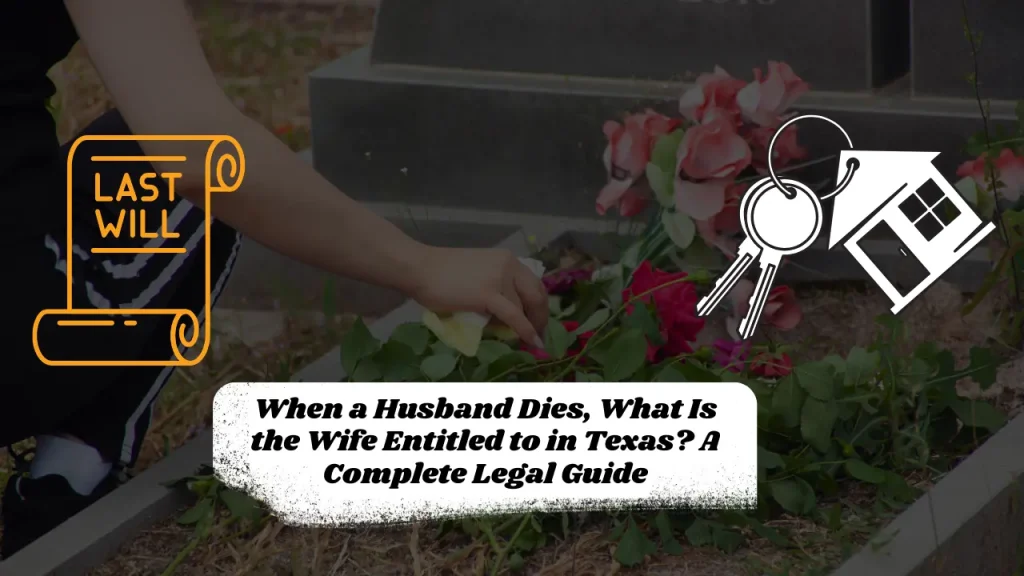When a Husband Dies, What Is the Wife Entitled to in Texas? A Complete Legal Guide
When a husband dies in Texas, what is his wife entitled to? The short answer: she is generally entitled to her share of community property and, depending on the circumstances, a portion of her husband’s separate property. If he dies without a will, Texas intestate succession laws determine how assets are distributed among the surviving spouse and children. But the process can be overwhelming.
Imagine Sarah, a Texas widow, suddenly drowning in paperwork while grieving her loss. Like many, she wondered, What am I entitled to after my husband’s death? With nearly 68% of Texans not having a will (SmartAsset), guiding inheritance laws can be complex. Understanding these rights can help widows secure their financial future during this difficult time.
Understanding Texas Community Property Laws
Texas follows community property laws, meaning that any assets acquired during the marriage belong equally to both spouses. These include income, real estate, and retirement benefits. However, separate property, such as assets owned before marriage or inherited individually, remains with the original owner unless stated otherwise in a will.
For example, if a husband passes away leaving a house (community property) and an inherited farm (separate property), the wife keeps her half of the house. The deceased husband’s half of the house is distributed based on his will or intestate laws. The inherited farm, being separate property, would be distributed to his heirs according to the will or intestate succession rules.
After a husband’s passing, the wife keeps her half of the community property, while the deceased’s half is distributed according to a will or state laws.
Read also: Do Bank Account With Beneficiaries Have To Go Through Probate
Intestate Succession: What Happens If There’s No Will?
If a husband dies without a will, Texas laws determine who inherits the estate:
| Scenario | Who Inherits? |
| No Children | Wife inherits all community and separate property. |
| With Children from the Marriage | Wife keeps her half of the community property and inherits the deceased husband’s half. Separate property is divided: Wife gets one-third of personal property and a life estate in one-third of real property; children inherit the rest. |
| With Children from Another Relationship | Wife keeps her half of the community property, but the deceased husband’s half goes entirely to his children. Separate property is split the same way as in the previous scenario. |
Homestead Rights for the Surviving Spouse
Texas law protects widows from losing their homes. Regardless of how the property is titled, the surviving wife has a legal right to continue living in the marital home for the rest of her life. This homestead right ensures that she cannot be forced out by other heirs.
Related article for you:
Does a Spouse Automatically Inherit a House in Texas?

Retirement Accounts, Life Insurance, and Beneficiary Designations
Certain assets, such as life insurance policies, retirement accounts (401(k), IRA), and payable-on-death accounts, are not subject to probate. Instead, they go directly to the named beneficiaries. It’s crucial to regularly update beneficiary designations to ensure the intended person receives these assets.
The Probate Process in Texas
Probate is the legal process of distributing assets according to a will or state laws. In Texas, simplified probate options are available for small estates, reducing legal costs and time. If a will exists, the probate court ensures the deceased’s wishes are carried out. If no will exists, intestate laws apply.
Tax Implications for the Surviving Spouse
Texas does not impose an estate or inheritance tax, but federal estate taxes may apply to estates exceeding a certain threshold. Surviving spouses should consult a tax professional to explore ways to minimize tax burdens and maximize inheritance benefits.
Social Security and Medicaid Benefits
A widow may be eligible for Social Security survivor benefits, depending on her age and her late husband’s work history. If she was at least 60 years old (or 50 if disabled) at the time of his passing, she can apply for survivor benefits. Medicaid eligibility may also change, so financial adjustments may be necessary to retain benefits.
Updating Legal Documents and Financial Accounts
After a husband’s death, a widow must update legal documents and financial accounts. A checklist includes:
- Updating wills and trusts
- Changing beneficiary designations on financial accounts
- Retitling jointly owned assets
- Reviewing powers of attorney and advance directives
Handling Disputes and Challenges
Estate disputes can arise among heirs. To address these challenges:
- Consider using mediation to resolve conflicts amicably.
- Consult an estate attorney for legal representation.
- Keep detailed records of all financial transactions and communications.
Emotional and Practical Steps for Widows
Beyond legal and financial matters, widows must also prioritize emotional healing. As Mary, a recent widow from Austin, shared, “Losing my husband was overwhelming, but what helped me the most was connecting with a support group of women who truly understood my journey.” Finding grief counseling, joining support groups, or talking to trusted friends can provide invaluable comfort during this difficult time. Consider:
- Grief counseling or support groups
- Financial planning assistance
- Legal guidance for long-term security
Conclusion
Understanding a widow’s rights in Texas is vital for ensuring financial and emotional stability. Whether handling property distribution, homestead rights, or beneficiary updates, seeking legal and financial advice is the best way to secure a stable future. If you’re dealing with this process, consult an estate attorney to protect your rights and secure your future.
About the Author

Sarah Klein, JD, is an experienced estate planning attorney who has helped clients with wills, trusts, powers of attorney, and probate matters. At All About Lawyer, she simplifies complex estate laws so families can protect their assets, plan ahead, and avoid legal headaches during life’s most sensitive moments.
Read more about Sarah
